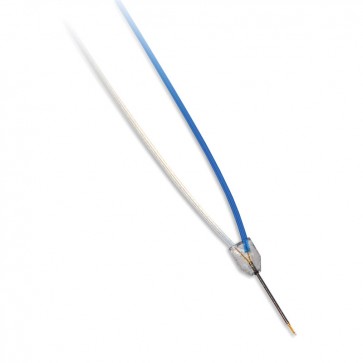CMA 7 Microdialysis Probes
NEW! CMA 7 PROBES FOR LARGE MOLECULES!
Ideal for use in small areas of the brain or spinal cord of small animals. It is especially suitable for studies in transgenic mice.
- Extremely small
- Optimized for CNS use
- Ideal for long-term implantation
- Membrane lengths: 1 or 2 mm
- Membrane diameter: 0.24 mm (6 kDa), 0.26 mm (55 kDa) or 0.28 mm (500 kDa or 2 MDa)
- Available metal free or β-irradiated
NEW! CMA 7 PROBES FOR LARGE MOLECULES!
The CMA 7 Microdialysis Probe is ideal for use in small areas of the brain or spinal cord of small animals. It is especially suitable for studies in transgenic mice.
The construction and geometry of the CMA 7 6 kDa Microdialysis Probe tip is exactly the same as in the CMA 11. The outer diameter is 0.24 mm and the shaft length is 7 mm.
New CMA 7 microdialysis probes are now available with 55 kDa cut-off and 0.26 mm outer diameter (more details in the Specifications section).
New CMA 7 microdialysis probes for large molecules are also now available with 500 kDa and 2 MDa cut-off, 0.28 mm outer diameter and 7 mm shaft length (more details in the Specifications section).
An extremely small plastic body, where the inlet and outlet tubing are directly mounted, makes this probe easy to implant and light for a small animal to carry. A matching small and lightweight guide cannula is available.
Standard part numbers are available for metal free or β-irradiated CMA 7 6 kDa probes.
For metal free or β-irradiated CMA 7 55 kDa, 500kDa and 2MDa probes, please make your request using our Custom Probe Form and send it to our Technical Support Team. We will contact you promptly.
CMA 7 Microdialysis Probes are guaranteed for single use.
| Probe Name | CMA 7 6 kDa | CMA 7 55 kDa | CMA 7 500 kDa, 2 MDa | |
| Membrane Length | 1 and 2 mm | 1 and 2 mm | 1 and 2 mm | |
| Membrane OD | 0.24 mm | 0.26 mm | 0.28 mmm | |
| Membrane Material | Cuprophane | Polyethersulfone (PES) | Polyethersulfone (PES) | |
| Molecular Weight Cut-Off | 6 kDa | 55 kDa | 500 kDa, 2 MDa | |
| Shaft Diameter | 0.40 mm | 0.40 mm | 0.40 mm | |
| Shaft Length | 7 mm | 7 mm | 7 mm | |
| Inlet Volume | 0.06 µL | 0.06 µL | 0.06 µL | |
| Outlet Volume | 0.3 µL | 0.3 µL | 0.3 µL | |
| 200 mm Inlet Tubing (Blue) ID 0.15 mm | 3.5 µL | 3.5 µL | 3.5 µL | |
| 200 mm Outlet Tubing (Transp.) ID 0.15 mm | 0.35 µL | 0.35 µL | 0.35 µL |
Selected Recent Publications
Dall, C. et al., 2017. Muscarinic receptor M4 positive allosteric modulators attenuate central effects of
cocaine. Drug and Alcohol Dependence, 176, pp.154–161.
Chen, X. et al., 2017. Influence of peptide transporter 2 (PEPT2) on the distribution of cefadroxil in mouse
brain: A microdialysis study. Biochemical Pharmacology, 131, pp.89–97.
Bank, J.H.H. et al., 2017. Gene expression analysis and microdialysis suggest hypothalamic triiodothyronine
(T3) gates daily torpor in Djungarian hamsters (Phodopus sungorus). Journal of Comparative Physiology B,
pp.1–12.
Ramírez-Jarquín, U.N. et al., 2017. Chronic infusion of SOD1G93A astrocyte-secreted factors induces spinal
motoneuron degeneration and neuromuscular dysfunction in healthy rats. Journal of Cellular Physiology,
p.n/a-n/a.
Yoshimoto, K. et al., 2017. Enhanced alcohol-drinking behavior associated with active cholinergic and
serotoninergic neurons in the lateral hypothalamus and amygdala. Pharmacology Biochemistry and
Behavior, 153, pp.1–11.
Ramírez-Jarquín, U.N. & Tapia, R., 2017. Chronic GABAergic blockade in the spinal cord in vivo induces
motor alterations and neurodegeneration. Neuropharmacology, 117, pp.85–92.
Moreno-Castilla, P. et al., 2017. Hippocampal release of dopamine and norepinephrine encodes novel
contextual information. Hippocampus, 27(5), pp.547–557.
Rapanelli, M. et al., 2017. Histamine H3R receptor activation in the do rsal striatum triggers stereotypies in a
mouse model of tic disorders. Translational Psychiatry, 7(1), p.e1013.
Pham, T.H. et al., 2017. Ketamine treatment involves medial prefrontal cortex serotonin to induce a rapid
antidepressant-like activity in BALB/cJ mice. Neuropharmacology, 112, Part A, pp.198–209.
Callan, S.P. et al., 2017. Toluene’s effects on activity and extracellular dopamine in the mouse are altered by
GABAA antagonism. Neuroscience Letters, 647, pp.67–71.
Visit our Publications page for a complete listing of CMA 7 publications.


